初中英语翻译疑问句
疑问句翻译

疑问句翻译:英语中疑问句有四种:一般疑问句、选择疑问句、特殊疑问句和反意疑问句。
1 、一般疑问句一般疑问句通常用来询问一件事情是否属实。
答句通常是"yes 或no"。
由助动词、系动词或情态动词开头。
Do you speak English?Do you live in Guangdong?Have you been living here?Are you from America?Can he swim?Must I go now?2 特殊疑问句疑问词有:疑问代词 who, whom, whose, which, what疑问副词 when, where, why, how, how much, how many, how long, how old, how far, how big构成:特殊疑问词+一般疑问句What do you read?Which book do you want?How did you get here?When did you arrive?Why did you do that?3 选择疑问句选择疑问句提出两个或两个以上可能的答案供对方选择。
这类疑问句由两部分组成:(一般疑问句)供选择的第一个部分 + 供选择的另一个部分+ ?Do you like to play football or basketball?Shall we walk, or shall we go by bus?Do you prefer apples, or pears, or plums, or cherries?4 反意疑问句主要有两部分组成:陈述部分 + 疑问部分主要有两种类型:陈述部分(肯定) + 疑问部分(否定)陈述部分(否定) + 疑问部分(肯定)It’s cold today, isn’t it?He doesn’t like it, does he?He is a teacher, isn't?You can solve the problem, can't you? 少数情况:祈使句部分(肯定)+ 疑问部分(肯定)Let us go, will you?请尽可能流畅地练习以下句子:1 早餐是一天中最重要的一餐,不是吗?2 这比乘公交车快,不是吗?3 他是怎么想的?4 你什么时候在学生中心做志愿者?5 放学后你会打篮球吗?6 你能停止打篮球吗?7 谁将做饭?8 你有没有想过给Tina买生日礼物?9 她喜欢轻音乐,不是吗?10 你什么时候开了一家咖啡吧?11 你对你的成功感到骄傲吗?12 你将来有何打算?13 你这几天都一直很晚睡吗?14 谁把你吵醒的?15 有没有叫他把收音机关小?16 她仅仅只是照看房子吗?17 你需要填写申请表吗?18 如果house-sitters(照看房子的人)做了那些事,他们就得不到报酬,是吗?19 你主要做哪些工作?20 你组织哪些活动?21 该组织是非暴力的吗?22 骑完单程要多长时间?23 有多少人会加入呢?24 自行车手什么时候开始比赛呢?25 这能起作用吗?26 这个活动的目的是干什么?27 比如说,我能做些什么?28 你写了关于什么的内容呢?29 编辑对你的文章满意吗?30 你可能就是他们一直要找的人,对吗?31 作为一名篮球球星,你最喜欢什么?32 你能高诉我一些训练的事情吗?33 你担心明天的比赛吗?34 你曾为哪份杂志撰稿过?35 你曾写过探险类的文章吗?36 你能否高诉我其中之一?37 为什么家长想自己教他们的小孩呢?38 在我们洗手过程中有什么要记住的吗?39 世界人口将成为一个大问题吗?40 你到达那里时一切如何?。
疑问句翻译及答案

疑问句翻译一般疑问句be/助动词/情态动词+主语+其他成分?1.每天花那么多时间在电脑游戏方面有必要吗?、2.您能告诉我一些关于期中考试的事情?3.网上购物将会取代传统的购物方式吗?4.你是否拿了我放在桌面的钥匙?5.你是否知道这里禁止吸烟?6.你打算参加即将到来的运动会吗?7. 你还没有完成老师布置的作业?特殊疑问句特殊疑问词+be/助动词/情态动词+主语+其他what & which 8.这个男孩的妈妈年轻时喜欢干什么?9.当我们学习英语时,应该注意什么?10.吸烟对我们有什么影响?12. 谁将会做一个关于如何节约水电的讲座?\13. 你已经在这儿呆了多长时间了?选择疑问句结构:一般疑问句+or+其他成分14 你喜欢单独旅游还是和朋友一起出游?15 你将搭乘飞机还是火车离开?一般疑问句+疑问词+从句, (从句采用正常语序)16.你知道有多少人将来听这个演讲吗?17.您介意告诉我是谁负责这个部门吗?18.您能告诉我怎样才能联系上她吗?19 你能告诉我他何时将到国外进修吗?20 你明白李教授刚才所说的话吗?1. Is it necessary to spend so much time on computer games every day?2. Can you tell me something about the Mid-term exam?3. Will online shopping take the place of the traditional shopping?4. Did you take the key (which/ that was ) put on the table by me?5. Do you know that smoking is forbidden here?6. Are you going to take part in the coming sports meeting?7. Haven’t you finished the homework assigned by teacher (yet) ?8. What did the boy’s mother enjoy doing when she w as young?9. What should we pay attention to when we learn English?10. What effect does smoking have on us?11. Who will make a speech about how to save water and electricity?12. How long have you stayed here?13Do you like to travel alone or with your friends?14Will you leave by air or by train?15Would you mind telling me who is in charge of the department?16Could you tell me how I can get in touch with her?17 Can you tell me when he will go abroad for further education?18 Do you understand what professor Li said just now?。
疑问句翻译+作文范文
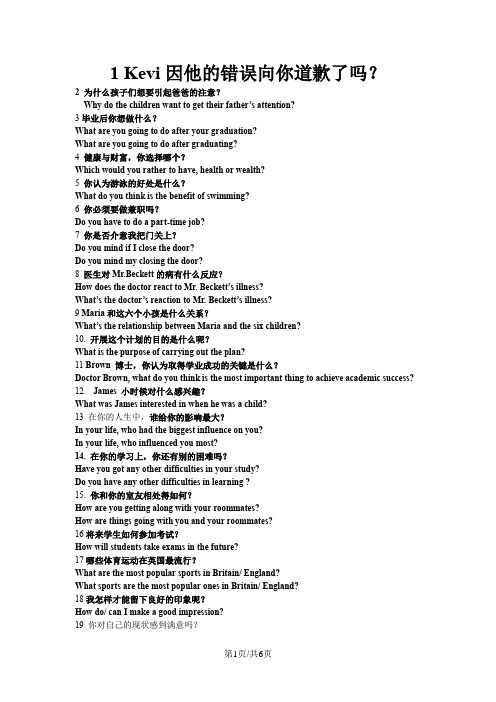
1 Kevi因他的错误向你道歉了吗?2 为什么孩子们想要引起爸爸的注意?Why do the children want to get their father’s attention?3毕业后你想做什么?What are you going to do after your graduation?What are you going to do after graduating?4 健康与财富,你选择哪个?Which would you rather to have, health or wealth?5 你认为游泳的好处是什么?What do you think is the benefit of swimming?6 你必须要做兼职吗?Do you have to do a part-time job?7 你是否介意我把门关上?Do you mind if I close the door?Do you mind my closing the door?8 医生对Mr.Beckett的病有什么反应?How does the doctor react to Mr. Beckett’s illness?What’s the doctor’s reaction to Mr. Beckett’s illness?9 Maria和这六个小孩是什么关系?What’s the relationship between Maria and the six children?10. 开展这个计划的目的是什么呢?What is the purpose of carrying out the plan?11 Brown 博士,你认为取得学业成功的关键是什么?Doctor Brown, what do you think is the most important thing to achieve academic success?12.James 小时候对什么感兴趣?What was James interested in when he was a child?13 在你的人生中,谁给你的影响最大?In your life, who had the biggest influence on you?In your life, who influenced you most?14. 在你的学习上,你还有别的困难吗?Have you got any other difficulties in your study?Do you have any other difficulties in learning ?15. 你和你的室友相处得如何?How are you getting along with your roommates?How are things going with you and your roommates?16将来学生如何参加考试?How will students take exams in the future?17哪些体育运动在英国最流行?What are the most popular sports in Britain/ England?What sports are the most popular ones in Britain/ England?18我怎样才能留下良好的印象呢?How do/ can I make a good impression?19 你对自己的现状感到满意吗?Are you satisfied with your current situation?20 虽然付出了努力,但是没有获得回报值得吗?Is it worthwhile that you make good efforts without any rewards?For you, Is it worth working hard without any rewards?21 你的目标是什么,获得成功还是学有所获?What’s the goal, achieving success or learning something?22 你可以想象女性在艰难的环境中是如何生孩子的吗?Can you imagine how the women give birth to babies in difficult conditions?23 当朋友处于困境中,如何让朋友振奋起来了?When your friends are in trouble, how do you cheer him/her up?24 用微信进行支付,给人们的生活带来了哪些便利?What convenience does We-chat pay bring people’s life?优秀作文分享(一)假如你是李华,计划和你班同学去参加某一社区组织的环保活动。
初中英语句子翻译技巧

初中英语句子翻译技巧精选我想,要很好的翻译初中英语句子,那么要有一定的方法,我是这样教学生翻译的:在简单句中,陈述句的翻译顺序跟汉语顺序差不多,如“我喜欢英语”I like English.在一般疑问句中,从助动词后主语开始翻译后再加一个“吗”字如“Do you like English?”你喜欢英语吗? 在特殊疑问句中也是从助动词后的那个主语开始翻译,但顺序从后到前。
如“What do you like?”“你喜欢什么?”在复合句中要先翻译从句,再翻译主句。
如“ I was watching TV wen my father came in.”“当我父亲进来的时候我正在看电视”莱曼夜话英语系列讲座(7):莱曼英语汉译英技巧(如何将汉语句子翻译成英语?)纵观各种英语教材和教学流派,很少有为学生提供有关汉译英技巧指导的,更多的是教育学生多做练习多看书。
固然,练习题在学习中是必不可少的,但是,方法才是最重要的。
没有方法,进步就不会很明显;没有方法,能力就很难灵活起来。
莱曼英语教学理念中,不仅将汉译英视为一种英语语言能力,而且,更将其视为培养英语思维方式的重要方法之一。
汉译英能力的培养,有助于提高英语作文和英语口语能力。
当我们进行英语写作时或进行口与交流时,不可避免地,下意识地在做着汉译英的翻译工作。
如果汉译英能力娴熟,那么,作文和口语都会变得异常的轻松。
千万不要轻信“抛弃母语,纯英语思考”的教条,三,五年之内的英语学习时不可能抛弃母语的,也不可能形成娴熟的英语思维方式的。
“抛弃母语,纯英语思考”对于大部分中国学生来说犹如水中月,镜中花,毫无现实意义而言。
因而,中国学生的写作和口语在刻苦努力的前提之下,仍然显得苍白无力。
同时,学院派式的翻译方法过于理论化,实用价值过低,不能帮助学生更加轻松直观地进行汉译英。
主,谓,宾,定,状,补,外加系词和表语使得大部分学生的英语句子顺序混乱,句意不明,难以表达自己完整明确的含义。
初三英语常用语法知识——疑问句(含答案)

一、选择题1.—Do you think if I am suitable for this IT job?—You can’t get the job________ you have experience in the computer industry.A.if B.unless C.because D.since B解析:B【解析】【分析】【详解】句意:—你认为我是否适合这份信息技术工作?—除非你有计算机行业的经验,否则你不会得到这份工作。
考查连词。
if如果;unless除非;because因为;since自从…以来。
作为问句的答语,句子“You can’t get the job”和“you have experience in the computer industry.”是条件关系。
只有从选项A和B中选择。
显然,选项A不符合题意。
故选B。
2.— Celia,join us in the Super Summer Camp if it this weekend.—.I'd love to. But nobody knows if it .A.is fine; rains B.is fine; will rain C.will be fine; will rain D.will be fine; rains B 解析:B【解析】试题分析:句意:——西莉亚,如果这个周末不下雨的话,就来加入我们的超级夏令营吧。
——我非常乐意。
但是没有人知道周末是否会下雨。
第一句中的连词if意为“如果”,用来引导条件状语从句,从句用一般现在时表示将来,故用is fine;第二句中的if意为“是否”,引导宾语从句,根据句意从句用一般将来时will rain。
故选B。
考点:考查条件状语从句的用法和宾语从句的用法。
3.______ you go to Sheshan, you’ll see a famous church and an observatory. A.Although B.What C.If D.Because C解析:C【解析】【详解】句意:如果你去佘山,你会看到一个著名的教堂和一个天文台。
初中英语基本句型翻译
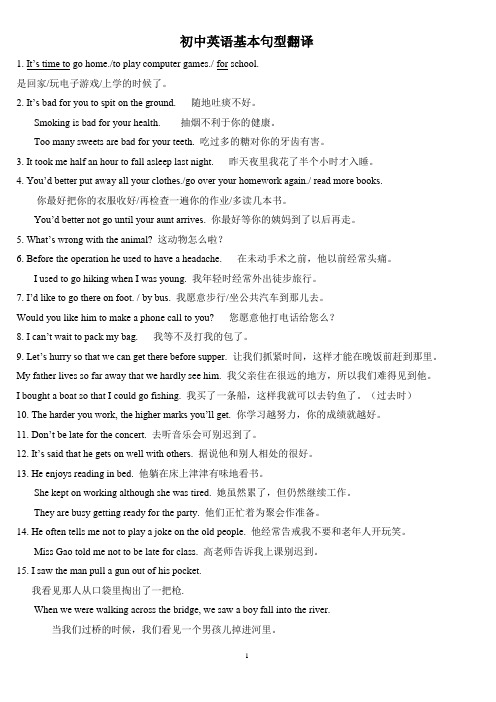
初中英语基本句型翻译1. It’s time to go home./to play computer games./ for school.是回家/玩电子游戏/上学的时候了。
2. It’s bad for you to spit on the ground. 随地吐痰不好。
Smoking is bad for your health. 抽烟不利于你的健康。
Too many sweets are bad for your teeth. 吃过多的糖对你的牙齿有害。
3. It took me half an hour to fall asleep last night. 昨天夜里我花了半个小时才入睡。
4. You’d better put away all your clothes./go over your homework again./ read more books.你最好把你的衣服收好/再检查一遍你的作业/多读几本书。
You’d better not go until your aunt arrives. 你最好等你的姨妈到了以后再走。
5. What’s wron g with the animal? 这动物怎么啦?6. Before the operation he used to have a headache. 在未动手术之前,他以前经常头痛。
I used to go hiking when I was young. 我年轻时经常外出徒步旅行。
7. I’d like to go there on foot. / by bus. 我愿意步行/坐公共汽车到那儿去。
Would you like him to make a phone call to you? 您愿意他打电话给您么?8. I can’t wait to pack my bag. 我等不及打我的包了。
9. Let’s hurry so that we can get there before supper. 让我们抓紧时间,这样才能在晚饭前赶到那里。
初中英语 疑问句
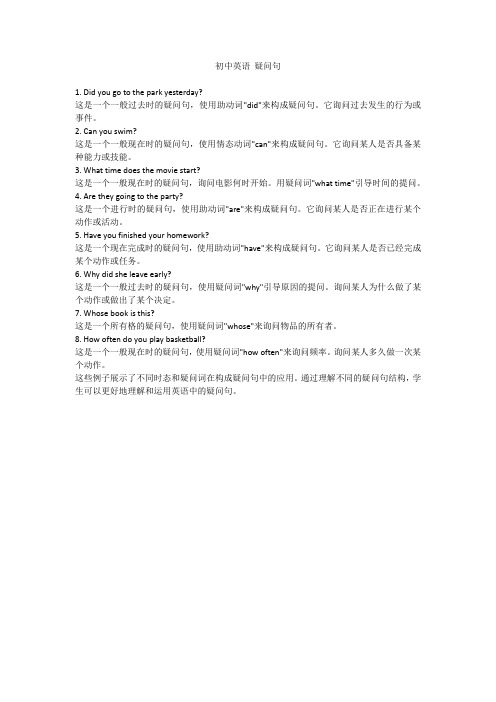
初中英语疑问句1. Did you go to the park yesterday?这是一个一般过去时的疑问句,使用助动词"did"来构成疑问句。
它询问过去发生的行为或事件。
2. Can you swim?这是一个一般现在时的疑问句,使用情态动词"can"来构成疑问句。
它询问某人是否具备某种能力或技能。
3. What time does the movie start?这是一个一般现在时的疑问句,询问电影何时开始。
用疑问词"what time"引导时间的提问。
4. Are they going to the party?这是一个进行时的疑问句,使用助动词"are"来构成疑问句。
它询问某人是否正在进行某个动作或活动。
5. Have you finished your homework?这是一个现在完成时的疑问句,使用助动词"have"来构成疑问句。
它询问某人是否已经完成某个动作或任务。
6. Why did she leave early?这是一个一般过去时的疑问句,使用疑问词"why"引导原因的提问。
询问某人为什么做了某个动作或做出了某个决定。
7. Whose book is this?这是一个所有格的疑问句,使用疑问词"whose"来询问物品的所有者。
8. How often do you play basketball?这是一个一般现在时的疑问句,使用疑问词"how often"来询问频率。
询问某人多久做一次某个动作。
这些例子展示了不同时态和疑问词在构成疑问句中的应用。
通过理解不同的疑问句结构,学生可以更好地理解和运用英语中的疑问句。
英语疑问句

• 2. 当你在2012年被评为感动温州的十大人物之一的时候,你感觉怎样?
How did you feel when you were honored as one of the top 10 figures who moved Wenzhou most in 2012?
• 3. 你将如何安排你未来的志愿者活动?
I want to ask him whether he will keep on picking up garbage on the Daluo Mountain. I want to ask him what attracted him to China. I want to ask him whether his relatives support his idea that he picks up garbage on the Daluo Mountain. I want to ask him how he felt when he was honored as one of the top 10 figures who moved Wenzhou most in 2012.
英语疑问句
• 一般疑问句 • 特殊疑问句
一般疑问句:可以用yes或no回答的问句
• 大声朗读,总结特点 • Can you speak English? • Can he swim? • Have you been living here? • Does he go to school on foot? • Will you be free tonight? • Are you tired? 翻译: 1. 你会坚持去大罗山捡垃圾吗?
3. 你可以去我们学校给我们做演讲吗?
Can you go to our school to give us a speech?
中考英语必考题型疑问句真题训练
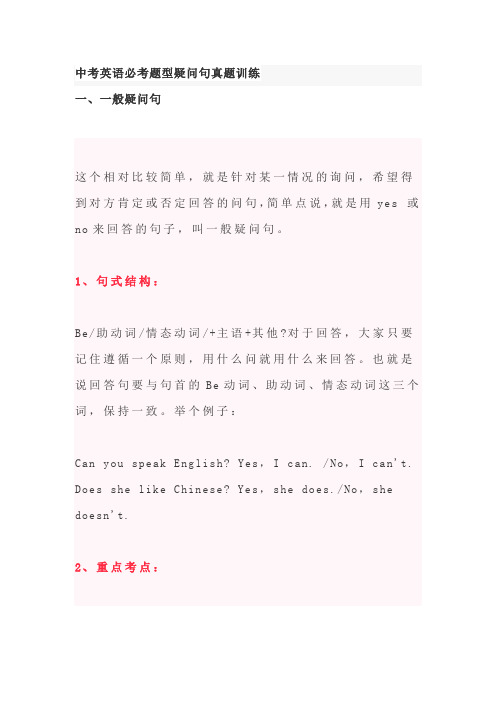
中考英语必考题型疑问句真题训练一、一般疑问句这个相对比较简单,就是针对某一情况的询问,希望得到对方肯定或否定回答的问句,简单点说,就是用yes 或no来回答的句子,叫一般疑问句。
1、句式结构:Be/助动词/情态动词/+主语+其他?对于回答,大家只要记住遵循一个原则,用什么问就用什么来回答。
也就是说回答句要与句首的Be动词、助动词、情态动词这三个词,保持一致。
举个例子:Can you speak English? Yes,I can. /No,I can't. Does she like Chinese? Yes,she does./No,she doesn't.2、重点考点:否定式一般疑问句。
也可以说一般疑问句的否定形式,就是在一般疑问句的句首,Be动词、助动词或情态动词的后面加上not,它表示的是反问或惊讶。
例如,Don't you know him?难道你不认识他吗?No,I don't.是的,我不认识。
Yes,I do.不,我认识。
提醒同学们特别要注意的是回答句,Yes翻译成"不",No 翻译成"是的"。
二、特殊疑问句"以特殊疑问词或者是疑问词组开头的句子,就叫特殊疑问句。
常用的特殊疑问代词有,what,which,who,whom,whose等;疑问副词有when,where,why,how;疑问词组,how soon,how often,how long,how far等。
1、句式结构:有两种形式。
1)对主语和主语的定语提问时,与陈述句的语序一样。
这种结构经常考,大家一定要多注意,举个例子:What makes you so worry?什么使得你如此担心?(对主语提问)Whose book is this?这是谁的书?(对主语的定语提问)2)对句子的其他成分提问的时候,疑问词+一般疑问句。
例如:What did you do last night?你昨天晚上做什么了?Which do you want to buy?你想要买哪一个?2、重点考点:否定式的特殊疑问句,构成很简单,特殊疑问词+否定疑问句,表达的意思是,劝告、建议或者责备等,这也是一个重要的考点,大家看例句就好理解了。
英语中的疑问句

英语中的疑问句疑问句主要用来提问。
根据其语法结构和交际功能,可以分为以下四种类型:一般疑问句、特殊疑问句、选择疑问句和歧义疑问句。
Are you a fireman? 你是一名消防员吗?(一般疑问句)What do you do at the weekend? 你周末干什么? (特殊疑问句)Would you like to have rice or noodles? 你喜欢吃米饭还是面条? (选择疑问句)He is a Chinese teacher, isn't he? 他是一名汉语老师,不是吗?(反意疑问句)一、一般疑问句(yes-no question)一般疑问句通常用来询问一件事情或一种情况是否属实,其回答通常是 yes 或 no,因此这类问句又叫做“是非问句”1、肯定提问Is there something wrong with this machine? 这台机器有问题吗Have you got today's milk? 你拿到今天的牛奶了吗Shall we go on? 我们继续向前吗Must I finish my work on time? 我必须按时完成我的工作吗Can you speak French? 你会说法语吗Would you like me to interpret for you? 要不要我帮你翻译Do you have a smaller size? 你有小一点的尺寸吗Does Susan speak English? 苏珊讲英语吗Did you mom go shopping last weekend? 你妈妈上个周末去买东西了吗2、否定提问Will he not agree with you? 他不同意你吗Haven't you any sisters? 你没有姐妹吗Don't you like this movie? 你不喜欢这部电影吗Can't we go together? 我们不能一起去吗Won't you sit down? 你不想坐下吗Hasn't she been up to the mark lately? 最近她一直感到不太舒服吗3、回答Will you agree with us to e here? 你同意我们来这里吗Yes, we will. 是的,我们会 | No, we won't. 不,我们不会Have got today's newspaper? 你有今天的报纸吗Yes, I have. 是的,有 | No, I haven't. 不,没有Can't he afford a new house? 他买不起新房吗Yes, he can. 不,他能 | No, he can't. 是的,他不能二、特殊疑问句(special question)特殊疑问句是对句中的某一部分提出疑问,通常以 who、where、when、why等疑问词开头,因此又叫“wh-问句”1、疑问代词疑问代词:who、whom、whose、which、whatWho are you? 你是谁Whom are you going to play table tennis this afternoon? 今天下午你和谁打乒乓球Whose glasses are broken? 谁的眼镜打碎了Which shoes do you like? 你喜欢哪双鞋子What do they want to do? 他们想要做什么2、疑问副词疑问副词:when、where、why、howWhen does she want to practice? 她想要什么时候练习Where is the restroom? 洗手间在哪里Why did you leave? 你为什么离开了How do you study English? 你怎么学习英语3、how 构成的短语how 构成的短语:how about = what about 怎么样、how many times 多少次、how do you say... 你怎么说、how are you 普通问好、how many/much 多少、how old 多大年纪、how far 多远、how often 多久一次、 how long 多久、how soon 多久以后等How about bringing some ice cream? 带一些冰激凌怎么样How do you say this word in English? 你怎么用英语说这个单词Howare you? how are you 只是普通问好的方式。
疑问句知识点详解(初中英语专项复习)4

疑问句知识点详解(初中英语专项复习)考向一:一般疑问句英语中的疑问句分为一般疑问句、特殊疑问句、选择疑问句和反意疑问句四种。
所谓一般疑问句,就是可以用yes或no来回答的疑问句。
1. 肯定形式的一般疑问句此类一般疑问句的结构为"连系动词be/助动词/情态动词+ 主语+ 动词原形+ 其他? "。
—Is he a good student? 他是一个好学生吗?—Yes, he is. 是的,他是。
/ No, he isn’t. 不,他不是。
—Does he go to school by bike? 他骑自行车去上学吗?—Yes, he does. 是的,他骑。
/ No, he doesn’t. 不,他不骑。
【典例】— Are there any notebooks on COVID-19 (新冠肺炎病毒) in your school?— _______. They tell us how to protect ourselves in this big event.A. Yes, they areB. Yes, there areC. Yes, there isD. Yes, it is【答案】B【解析】考查there be句型。
句意:——你们学校有新冠肺炎病毒的笔记本吗?——是的,有。
它们告诉我们在这个大事件中如何保护自己。
Are there…句式的答语:Yes, there are. /No, there aren’t. 故选B。
2. 否定形式的一般疑问句此类一般疑问句主要表示反问或惊讶,通常在连系动词be,情态动词或助动词后加not的缩略式n’t,并放在句首。
—Aren’t you a writer? 难道你不是作家吗?—No, I’m not. 是的,我不是。
【注意】在这样的句子中,要注意句子的翻译,yes翻译成"不",no翻译成"是的"。
【典例】—What a fine day!Let’s go for a picnic, _______ ?—Sounds like a good idea.A. shall weB. don’t weC. can we【答案】A【解析】考查反意疑问句。
翻译疑问句——精选推荐
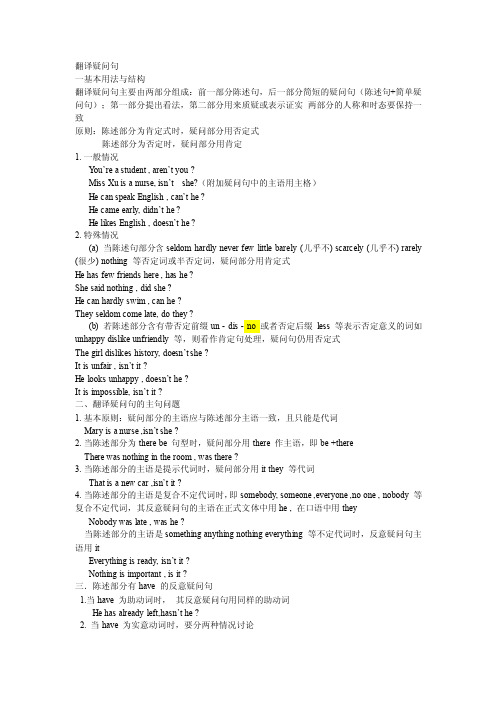
翻译疑问句一基本用法与结构翻译疑问句主要由两部分组成:前一部分陈述句,后一部分简短的疑问句(陈述句+简单疑问句);第一部分提出看法,第二部分用来质疑或表示证实两部分的人称和时态要保持一致原则:陈述部分为肯定式时,疑问部分用否定式陈述部分为否定时,疑问部分用肯定1.一般情况Y ou’re a student , aren’t you ?Miss Xu is a nurse, isn’t she?(附加疑问句中的主语用主格)He can speak English , can’t he ?He came early, didn’t he ?He likes English , doesn’t he ?2.特殊情况(a) 当陈述句部分含seldom hardly never few little barely (几乎不) scarcely (几乎不) rarely (很少) nothing 等否定词或半否定词,疑问部分用肯定式He has few friends here , has he ?She said nothing , did she ?He can hardly swim , can he ?They seldom come late, do they ?(b) 若陈述部分含有带否定前缀un - dis - no 或者否定后缀less 等表示否定意义的词如unhappy dislike unfriendly 等,则看作肯定句处理,疑问句仍用否定式The girl dislikes history, doesn’t she ?It is unfair , isn’t it ?He looks unhappy , doesn’t he ?It is impossible, isn’t it ?二、翻译疑问句的主句问题1.基本原则:疑问部分的主语应与陈述部分主语一致,且只能是代词Mary is a nurse ,isn’t she ?2.当陈述部分为there be 句型时,疑问部分用there 作主语,即be +thereThere was nothing in the room , was there ?3.当陈述部分的主语是提示代词时,疑问部分用it they 等代词That is a new car ,isn’t it ?4.当陈述部分的主语是复合不定代词时,即somebody, someone ,everyone ,no one , nobody 等复合不定代词,其反意疑问句的主语在正式文体中用he , 在口语中用they Nobody was late , was he ?当陈述部分的主语是something anything nothing everything 等不定代词时,反意疑问句主语用itEverything is ready, isn’t it ?Nothing is important , is it ?三.陈述部分有have 的反意疑问句1.当have 为助动词时,其反意疑问句用同样的助动词He has already left,hasn’t he ?2. 当have 为实意动词时,要分两种情况讨论A.若表示所有,反意疑问句可以用have 也可以用doHe has a lot of friends here , hasn’t (doesn’t ) he ?B. 若表示吃玩等意思,反意疑问句要用doHe has supper at 5 , doesn’t he?He had a good time at the party, didn’t he ?四.含情态动词的反意疑问句1 基本原则:在通常情况下,当陈述部分含情态动词时,疑问部分会重复前面同样的情态动词He can speak English , can’t he ?We shouldn’t go, should we ?2. 当陈述部分含有must 时,分情况讨论A.若must 表示必须或有必要,疑问部分用mustn’t / needn’tY ou must leave at once , mustn’t you ?但陈述部分有mustn’t 表示禁止,疑问部分则要用mustY ou mustn’t laugh, must you ?B. 若must 表示推测,疑问部分不能用must ,而应根据must 后的动词采用相应的动词形式He must be tired , isn’t he ?五.陈述部分为祈使句的反意疑问句1 基本原则若陈述部分为祈使句,疑问部分通常用will youPlease help us, will you ?Give me a hand , will you ?Come with us , will you ?Don’t forget to post the letter , will you ?2.当祈使句为let’s 时,疑问句部分必须用shall weLet’s go there together ,shall we ?六.陈述部分为主从复合句的反意疑问句1. 当陈述部分谓语为think (believe suppose expect imagine ) that 等时,疑问部分通常与从句主谓保持一致I think that it is too short , isn’t it ?(否定的后移)当这些动词后接的宾语从句的否定转移到主句时,其仍属于否定句,故后面的简短问句用肯定形式I don’t believe that he can translate this book, can he?I don’t think he will come , will he ?(注) 这类用法主要限于主语为第一人称且think 等动词为一般现在时的情形七.几种特殊情况的反意疑问句1. I’m wrong , aren’t i ?2. I wish to go with them , may I ?3. 当陈述部分有had better 时,疑问部分用hadn’t八反意疑问句回答They work hard , don’t they ?Y es , they doThey don’t work hard , do they ?Y es they do .He can speak English, can’the?(附加疑问句中的主语用主格)He came early, didn’t he?(附加疑问句中的主语用主格)He likes English, doesn’t he他喜欢英语,是吗?(附加疑问句中的主语用主格)He doesn’tlike English, does he?他不喜欢英语,是吗?(附加疑问句中的主语用主格)教你如何用WORD文档(2012-06-27 192246)转载▼标签:杂谈1. 问:WORD 里边怎样设置每页不同的页眉?如何使不同的章节显示的页眉不同?答:分节,每节可以设置不同的页眉。
翻译疑问句的讲解及练习

反意疑问句的讲解及练习由"陈述句 + 附加疑问句"两部分构成。
一般有两种形式:前肯后否或前否后肯。
对附加疑问部分应注意以下几点:1)主语只能用人称代词;2)附加疑问句的not必须与(be /助/情)缩写;3)附加疑问句的时态必须与陈述部分的时态一致。
eg.1)Tom is a worker, isn't Tom?(找错)_______2)You can swim, can not you?(找错)______3)He had lunch, doesn't he?(找错)________特别注意以下几种反意疑问句1. 陈述部分含否定意味的词(few, little,never, nothing, nobody, no, hardly, none),附加疑问句应使用肯定形式(但前缀词unhappy, unlike, disappear等列外)eg. They are unhappy, aren't they?2.陈述部分的主语是everything, something, nothing, anything时,附加疑问句的主语应用it;陈述部分的主语是everybody, somebody, nobody, everyone, no one时,附加疑问句的主语应用they。
eg.1)Everything is ready, ___________?2)Everyone is here, ____________?3.陈述部分是祈使句时,附加疑问句一般用:will you? 但注意:Let's … , shall we?Let us … , will you?4.陈述部分含must时,附加疑问句一般用needn't.eg. I must finish my work now, _________?5.陈述部分是there be结构时,应用there be结构来完成。
疑问句怎么翻译

疑问句怎么翻译
疑问句的翻译不是固定的,它取决于所表达的具体问题和语境。
以下是一些常见的疑问句的翻译示例,供参考:
1. What is your name?(你叫什么名字?)
2. Where do you live?(你住在哪里?)
3. When is the meeting?(会议是什么时候?)
4. Why did you do that?(你为什么那样做?)
5. How can I help you?(我怎样才能帮助你?)
6. Can you speak English?(你会说英语吗?)
7. Would you like some tea?(你想要些茶吗?)
8. Have you finished your homework?(你完成作业了吗?)
9. Did you see the movie?(你看过这部电影吗?)
10. Are you feeling okay?(你感觉还好吗?)
以上只是一些简单的疑问句的翻译示例,具体的翻译方式还需要根据具体的语境和句子结构来决定。
疑问句用英语怎么说

疑问句用英语怎么说疑问句是按照句子的语气分出来的一个类,它与陈述句、感叹句、祈使句的最大区别就是它的疑问语气。
那么你知道疑问句用英语怎么说吗?下面跟着店铺一起来学习一下吧。
疑问句的英语说法:Interrogative sentence疑问句相关英语表达:选择疑问句 alternative question反义疑问句 disjunctive question修辞疑问句 rhetorical question否定疑问句 negative question直接疑问句 direct question一般疑问句 general question特殊疑问句 special question疑问句的英语例句:1. In English, some questions have a rising intonation.英语中有些疑问句使用升调。
2. Questions are spoken with a rising intonation.疑问句是以升调说出来的.3. The indirect question below has a rising intonation.间接疑问句用上升语调.4. We usually end questions with a rising inflection.通常我们在疑问句结尾把音调提高.5. In English, some questions have a rising intonation.英语中有些疑问句需用升调.6. Make these sentences negative and interrogative.将这些句子改成否定句和疑问句.7. Compare the use of which and what as determiners and pronouns in questions.试比较which和what用作限定词和代词时,在疑问句中的用法.8. Tag - question normally consists of a statement and a question tag.反义疑问句通常有陈述句和一般疑问句构成.9. WH - movement is obligatory in English. It changes sentence from affirmative to interrogative.英语中WH移位对肯定句变疑问句是属于强制性的.10. To know time zones & time differences, to review Wh - questions.了解时区以及时差, 并且复习一般疑问句和特殊疑问句.11. Write negative answers to these questions in two different ways.用两种不同的方式来对以下疑问句作出否定的回答.12. Restricted interrogative sentences are pragmatically presented as various untrue interrogative sentences.受限制疑问句在语用上表现为各种非真性问句.13. You can use negative statements with positive question tags to make requests.由否定陈述句加肯定简短问句构成的反意疑问句可用以提出请求.14. There are three forms of the sentences affirmative, interrogative, and negative.句子有三种形式:肯定句、否定句和疑问句.15. Change the following sentences into questions, using the Passive Voice.把下列句子变成疑问句, 要用被动语态.。
翻译疑问句练习

反义疑问句练习1, You are new here, ________?2, Bob doesn’t like thrillers, __? 3, The park is really crowded, _? 4, There won’t be more pollution in ten years,__?5, You were born in Shanghai, ____? 6, You don’t speak Chinese, ______? 7, Peter hasn’t arrived ye t, _____? 8, Mary speaks good Chinese, _____? 9, He’ll be back tomorrow, ________? 10, John has grown a lot , _________? 11, My brother failed his exams, ___? 12, There’s something wrong, ______? 13, Everyone knows his job, _______? 14, Everyone knows their job, ______? 15, He can swim, ________________? 16, You lost your way, _____________?17, Let’s go fishing, ___________? 18, Let us know your new address, ___? 19, Let’s not go to the party, ______? 20, Open the door, ____________? 21, Give me a hand _______________? 22, Don’t forget ________________? 23, Everything has gone wrong, _____? 24, The boy was riding his bike in the stree then ____________?25, They go to school by bus every day , _____________?26, An elephant is strong , ________? 27, Peter could hardly see the words on the blackboard, ______?28, Jim is never late for school,_______________?29, She had nothing for breakfast , ___________?30, There is few apples on the table, ___________________?31, There is little water in the bottle, ________________?32, Few people knew this word, _____? 33, Nobody likes that dog ,____________?34, The king wasunhappy______________?35, She dislikes him,__________________?36, It’s unfair, ___________?37, It’s impossible for me to do it , ______________?38, The little girl could hardly speak at the age of 3, _____?39, You must be from America,______________?40, Linds can’t be a doctor,_________________?41, The town government set up a new modern hospital, ________?42, There will be a volleyball match in our school, __________?43, The little boy hurt his foot, ______________?44, You’d better not stand in the way , ______________?45, You’d like to go there,______________?46, Lucy has to do some washing , __________________?47, Jim needn’t sing this song,___________________?48, Jim needs to wait for her ,__________________?49, I think he is wrong ,____________________?50, We don’t believe he will come , _________________?51, I think they knew little about it , ______________?52, David says that you will come in time , ________________?53, He says that I did it ,_____________________?54, Tom doesn’t believe she studies well, __________________?55, I don’t believe he studies harder, ____________?56, Don’t make any noi se ,_________________?57, Not only I but also he has been there, ______________?58, Neither you nor she lives there, ___________?59, Both t Tom and Jack came,___________?60, David is a farmer but his wife isn’t a farmer, ____________?61, I am right, _____________? 62, What a kind girl,_______________?63, What cold weather,_______________?64, I wish I were you ,________________?65, Everything seems all right , ___________________?66, Swimming is great fun ,_______________?67, He used to walk to school, ______________?68, Most of the books are mine, ______________?69, Most of the food was left , __________________?70, None of us knew what to do , ________________?71, The twins had to walk home, ____________?参考答案:1, aren’t you2.does he3.isn’t it4.will there5, weren’t you6.do you7.has he8.doesn’t she9.won’t he10.hasn’t he11.didn’t he12.isn’there13.don’t they14.don’t they15.can’t he16.didn’t you17.shall we 18/will you19.shall we20.willyou21.willyou22.willyou23.hasn’t it 24wasn’t he25don’tthey 26isn’tit27.could he28.is he29did she30isthere31 is there 32did they34wasn;t he 35doesn’t she 36isn’t it37isn’t it38 couldshe39 aren’t you 40is she41didn’t it 42won’t there 43didn’t he44 had you45.would’t you46.doesn’tshe47.need he48/doesn’t he 49isn’the50.willhe52doesn’t he 53doesnthe54 does she55doeshe56willyou57, haven’t we58.do you59.didn’t they60.is she61, arent i 62, isn’t it 63, isn’t it 64, may I65, doesn’t it 66isnt it67didn’t he68aren’t they69 wasn’t it70 did we71, didn’t they。
翻译疑问句

翻译疑问句1. What time is it now?现在几点了?2. Can you speak English?你会说英语吗?3. Where is the nearest hospital?最近的医院在哪里?4. How much does this cost?这个多少钱?5. Why did you do that?你为什么这样做?6. Do you know where he went?你知道他去了哪里吗?7. What is your favorite food?你最喜欢的食物是什么?8. Who is coming to the party tonight? 今晚谁要来参加派对?9. How far is it from here to the airport? 从这里到机场有多远?10. When will you be back?你什么时候回来?11. Are you sure about that?你对此确定吗?12. Are you busy right now?你现在忙吗?13. What's the weather like tomorrow?明天的天气怎样?14. Can you help me with this problem?你能帮我解决这个问题吗?15. Are you going to the concert tonight?你今晚要去音乐会吗?16. Have you seen my keys?你看到我的钥匙了吗?17. How long did it take you to finish the project?你完成这个项目花了多长时间?18. What did you think of the movie?你觉得那部电影怎么样?19. Can you recommend a good restaurant in this area? 你能推荐一家好的餐厅吗?20. Why are you late?你为什么迟到了?21. What are you doing this weekend?你这个周末打算做什么?22. How can I improve my English speaking skills?如何提高我的英语口语能力?23. Are you sure you understood the instructions?你确定你理解了指示吗?24. What's your opinion on the matter?你对这件事有什么意见?25. Is there any chance of getting a refund?有可能退款吗?26. Can you give me some directions to the nearest gas station? 可以告诉我去最近的加油站的路吗?27. Do you know what time the train leaves?你知道火车几点开吗?28. How often do you go to the gym?你多久去一次健身房?29. Can you please repeat that?你能再说一遍吗?30. What do you want to do for dinner?晚饭你想吃什么?31. Are you feeling okay?你感觉好吗?32. Can you explain that to me?你能解释给我听吗?33. What's the name of this song?这首歌叫什么名字?34. Are you going to the party tomorrow?你明天要去派对吗?35. Can you teach me how to cook this dish?你能教我如何烹饪这道菜吗?36. Why did you choose that color?你为什么选择那个颜色?37. What's the best way to learn a new language? 学习一门新语言最好的方法是什么?38. Can you lend me some money?你能借我一些钱吗?39. Why did you decide to study abroad?你为什么决定出国留学?40. What are your plans for the weekend? 你这个周末有什么计划?。
翻译疑问句练习题

翻译疑问句练习题在学习翻译过程中,疑问句的翻译是一个非常重要的环节。
疑问句的特点是对陈述句提问,需要我们在翻译过程中准确表达出原文中的疑问意思。
为了帮助大家更好地掌握疑问句的翻译技巧,本文将提供一些翻译疑问句的练习题,希望能够对大家的学习有所帮助。
练习题一:选择正确的疑问词1. _______________ do you like to eat for breakfast?你早餐喜欢吃什么?A) HowB) WhatC) WhenD) Why2. _______________ is your favorite color?你最喜欢的颜色是什么?B) WhatC) WhenD) Why3. _______________ did you go last weekend?上个周末你去了哪里?A) HowB) WhatC) WhereD) Why4. _______________ did you buy this book?你为什么买这本书?A) HowB) WhatD) Why练习题二:将以下疑问句翻译成英文1. 你是英国人吗?Are you British?2. 他喜欢吃什么?What does he like to eat?3. 他们今天早上几点起床的?What time did they get up this morning?4. 你想要了解什么?What do you want to know?练习题三:将以下英文疑问句翻译成中文1. Where are you going?你要去哪里?2. How long have you been studying Chinese?你学习汉语多长时间了?3. Why did you choose this university?你为什么选择这所大学?4. What time does the movie start?电影什么时间开始?练习题四:将以下疑问句进行改写1. Who is the teacher?The teacher is who?2. Where did you go?You went where?3. How much does it cost?It costs how much?4. Is she coming with us?Is she coming with us or not?练习题五:将以下疑问句进行转换1. Did you finish your homework?You finished your homework, didn't you?2. Can I help you?Can I be of any assistance to you?3. Does he like to swim?Does he enjoy swimming?4. Will you come to the party?Are you going to come to the party?以上是一些翻译疑问句的练习题,通过这些练习题,我们可以更好地掌握疑问句的翻译技巧。
特殊疑问句和翻译疑问句

疑问句一.特殊疑问句一.特殊疑问句1. 特殊疑问句的构成:"特殊疑问词+一般疑问句语序" How old are you? What's this in English? 如果问的是主语或主语的定语时,这时的特殊疑问句:"特殊疑问词(+主语)+陈述句语序"。
如:Who's not here today? Which pen is red? My father is an engineer.---_____________________________? Mr. Zhang is going to teach us physics.---_______________________________? 2. 无论是做疑问代词还是限定词,which 和what 所指的范围不同。
what所指的范围是无限的,而which则指在一定的范围内,例如:Which girls do you like best? 你喜欢哪几个姑娘?What girls do you like best? 你喜欢什么样的姑娘?Which do you prefer, coffee or tea? 咖啡和茶,你喜欢喝哪种?What do you usually drink before dinner? 你饭前通常喝什么?3. Whom是who的宾格,在书面语中,它作动词宾语或介词宾语,在口语中作宾语时,可用who代替,但在介词后只能用whom, 例如:Who(m) did you meet on the street?你在街上遇到了谁?Who(m) are you taking the book to?你要把这书带给谁?To whom did you speak on the campus?你在校园里和谁讲话了?4. 各种问句1)询问天气。
“How +be +the weather...?”与“What +be +the weather like...?” 今天天气如何?_______________________? =____________________________? 2) 对具体时间提出疑问,如in the morning, last Sunday等,疑问词用________;对具体几点钟提问,疑问词应用__________。
- 1、下载文档前请自行甄别文档内容的完整性,平台不提供额外的编辑、内容补充、找答案等附加服务。
- 2、"仅部分预览"的文档,不可在线预览部分如存在完整性等问题,可反馈申请退款(可完整预览的文档不适用该条件!)。
- 3、如文档侵犯您的权益,请联系客服反馈,我们会尽快为您处理(人工客服工作时间:9:00-18:30)。
初中英语翻译疑问句
1) 陈述部分的主语是I,疑问部分要用aren't I.
I'm as tall as your sister,aren't I?
2) 陈述部分的谓语是wish,疑问部分要用may +主语。
I wish to have a word with you, may I?
3) 陈述部分用no, nothing, nobody, never, few, seldom, hardly, rarely, little等否定含义的词时,疑问部分用肯定含义。
The Swede made no answer, did he / she?
Some plants never blown (开花), do they ?
4) 含有ought to 的反意疑问句,陈述部分是肯定的,疑问部分用shouldn't / oughtn't +主语。
He ought to know what to do, oughtn't he? / shouldn't he?
5) 陈述部分有have to +v. (had to + v.),疑问部分常用don't +主语(didn't +主语)。
We have to get there at eight tomorrow, don't we?
6) 陈述部分的谓语是used to 时,疑问部分用didn't +主语或usedn't +主语。
He used to take pictures there, didn't he? / usedn't he?
7) 陈述部分有had better + v. 疑问句部分用hadn't you?
You'd better read it by yourself, hadn't you?
8) 陈述部分有would rather +v.,疑问部分多用wouldn't +主语。
He would rather read it ten times than recite it, wouldn't he?
9) 陈述部分有You'd like to +v. 疑问部分用wouldn't +主语。
You'd like to go with me, wouldn't you?
10) 陈述部分有must 的疑问句,疑问部分根据实际情况而定。
He must be a doctor, isn't he?
You must have studied English for three years, haven't you? / didn't you?
He must have finished it yesterday, didn't he?
11) 感叹句中,疑问部分用be +主语。
What colours, aren't they?
What a smell, isn't it?
12) 陈述部分由neither…nor, either…or 连接的并列主语时,疑问部分根据其实际逻辑意义而定。
Neither you nor I am engineer, are we?
13) 陈述部分主语是指示代词或不定代词everything, that, nothing, this, 疑问部分主语用it。
Everything is ready, isn't it?
14) 陈述部分为主语从句或并列复合句,疑问部分有三种情况:
a. 并列复合句疑问部分,谓语动词根据邻近从句的谓语而定。
Mr. Smith had been to Beijing for several times, he should have been in China now, shouldn't he?
b. 带有定语从句,宾语从句的主从复合句,疑问部分谓语根据主句的谓语而定:
He is not the man who gave us a talk, is he?
He said he wanted to visit Japan, didn't he?
c. 上述部分主句谓语是think, believe, expect, suppose, imagine等引导的定语从句,疑问部分与宾语从句相对应构成反意疑问句。
I don't think he is bright, is he?
We believe she can do it better, can't she?
15) 陈述部分主语是不定代词everybody, anyone, somebody, nobody, no one等,疑问部分常用复数they,有时也用单数he。
Everyone knows the answer, don't they?(does he?)
Nobody knows about it, do they? (does he?)
16) 带情态动词dare或need的反意疑问句,疑问部分常用need (dare ) +主语。
We need not do it again, need we ?
He dare not say so, dare you?
当dare, need 为实义动词时,疑问部分用助动词do + 主语。
She doesn't dare to go home alone, does she?
17) 省去主语的祈使句的反意疑问句,疑问部分用will you。
Don't do that again, will you?
Go with me, will you / won't you ?
注意:Let's 开头的祈使句,后用shall we?
Let us 开头的祈使句,后用will you?
Let's go and listen to the music, shall we?
Let us wait for you in the reading-room, will you ?
18) 陈述部分是"there be"结构的,疑问部分用there省略主语代词。
There is something wrong with your watch, isn't there?
There will not be any trouble, will there?
19) 否定前缀不能视为否定词,其反意疑问句仍用否定形式。
It is impossible, isn't it?
He is not unkind to his classmates, is he?
20) must在表"推测"时,根据其推测的情况来确定反意疑问句。
He must be there now, isn't he?
It must be going to rain tomorrow, won't it?
快速记忆表
陈述部分的谓语疑问部分
I aren't I
Wish may +主语
no,nothing,nobody,never,
few, seldom, hardly, 肯定含义
rarely, little等否定
含义的词
ought to(肯定的)shouldn't/ oughtn't +主语have to+v.(had to+v.) don't +主语(didn't +主语) used to didn't +主语或usedn't +主语had better + v. hadn't you
would rather + v. wouldn't +主语
you'd like to + v. wouldn't +主语
must 根据实际情况而定
感叹句中be +主语
Neither…nor,
either…or 连接的根据其实际逻辑意义而定
并列主语
指示代词或不定代词
everything,that, 主语用it
nothing,this
并列复合句谓语根据邻近从句的谓语而定定语从句,宾语从句的
主从复合句根据主句的谓语而定
think,believe,expect,
suppose,imagine等引导与宾语从句相对应的从句everybody,anyone,
somebody,nobody,no one 复数they, 单数he
情态动词dare或need need (dare ) +主语
dare, need 为实义动词do +主语
省去主语的祈使句will you?
Let's 开头的祈使句Shall we?
Let us 开头的祈使句Will you?
there be 相应的谓语动词+there(省略主语代词)否定前缀不能视为否定词仍用否定形式
must表"推测"根据其推测的情况来确定反意疑问句。
